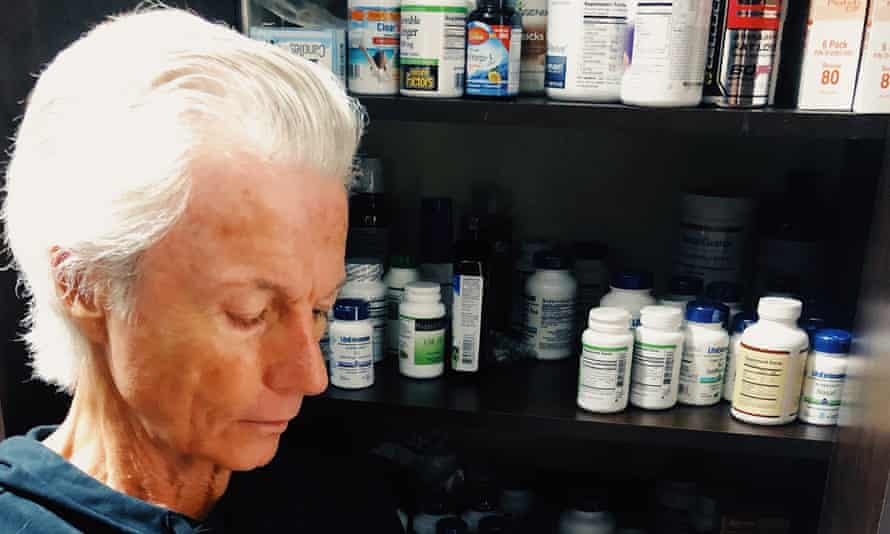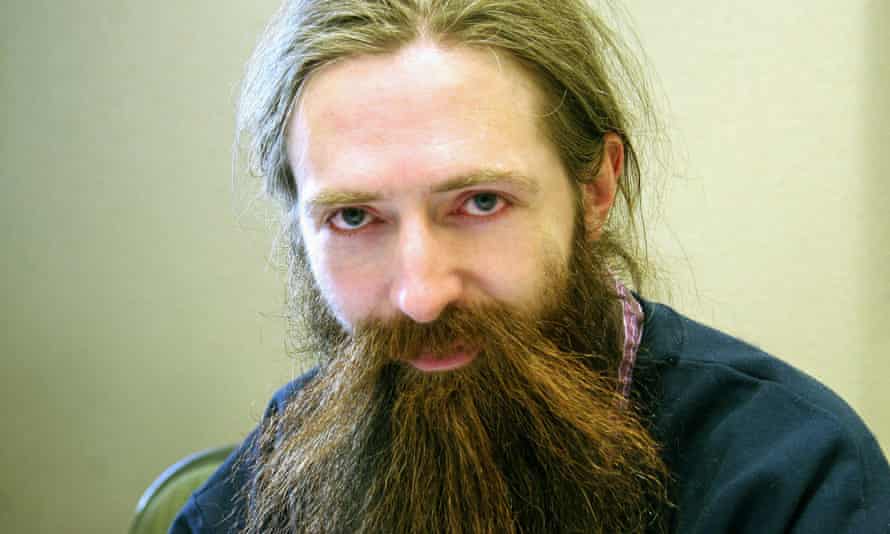The world of tomorrow: “It’s time to look beyond death to a future of unlimited life.” Illustration: Nate Summer / The Observer
Some sleep on electromagnetic mats, others take up to 150 pills a day. But are ‘life extensions’ closer to finding the key to longevity?Alex Moshakis meets some of the people who are determined to be immortal
Life extensions (or longevity, or immortality) are carefully enumerated into two types. The first are rationalists: scientific researchers such as gerontology, the study of aging, exhaust the many technical difficulties of ending entropy.
Sterol is the second type. A businessman, he does not have official scientific training, but nevertheless is firmly committed to the goal, eager to overcome new findings. He hopes to live indefinitely, or at least until 150. But in the end, it relies on researchers to find a way. Less computerizing himself as part of a gerontological group , but more as a polite optimistic mega-fan, sitting on the margins of science, ready for a major breakthrough.
He is not alone. Life extensions have increasingly become an enthusiastic and vocal group. The community includes venture capitalists and Silicon Valley billionaires, all non-gerontologists, and almost all men, who consider death undesirable and seem to have earned so much money that they need an endless life to spend it. But now only mortals join the masses, full of fantasies of eternal life. Human beings had a lust for immortality as long as they were alive.
So far the search has not succeeded – we are still dead!
But good news: the reports of paradise are closer than ever, and private clinics and online pharmacies promise to help us get there, “there” will be the future, all that.

Stroll has been an evangelist of human immortality since he was a child, when his grandmother passed away, and he felt “a pain you can’t even describe, it’s so deep in my gut.” He was 11 years old, still new to the world, and he thought of death, as most of us do at one point or another, as extremely unfair.
In the early 1970s, when he was in his twenties, he began touring the United States as a public speaker, participating in gerontological research that was then limited, yet expanding his possibilities and championing the anti-aging benefits of positive thinking:
“Is it true that life is great? You can live forever if you really strive for it!”
Since Sterol is not scientifically certified, he has largely based his patterns around inspiring tips for life health, many of which will now fall under the health umbrella of common sense: exercise, eat well but not too much, take care of yourself.
But still his message seemed extreme, and he was not always well received. The audience wary of Strul’s ideas condemned him for examining the will of God or disrupting the natural order. His concepts are contrary to the common worldview – that we live and then we die. Particularly strict spectators referred to him as “the devil”. From time to time, he received death threats.
“To keep his mind flexible, Marius reads the newspaper upside down in the mirror”
However, he persevered. He considered himself lucky to work in a field that he was convinced was on the verge of a major breakthrough around the corner. To fully prepare his body for the life of centuries, he adopted a strict health regimen. He fasted, did juice cleaning, cleaned and devoured food supplements, and invited the audience to do so. In the end, a community was formed, driven by a common and urgent aversion to death. “We felt then how important it was to do everything you could to stay alive,” he says.
Stroll is already 70 years old. He lives in Scottsdale, Arizona, a desert city. In a state of life extension, it avoids milk and rarely touches the bread, although it consumes a whole pile of other things. Recently, his diet has included “cognitive” pills, which he takes twice a day and claims to have all kinds of nourishing effects on his brain. (What is beneficial to maintain the body if not the mind?) The pills are part of a self-directed anti-aging process that requires a lot of ingestion. On some days, sterol takes 70 supplements, including a tablet that “stimulates the mitochondria” (the mitochondria produce energy) and whose effects resemble a “coffee shot, less annoying”, as well as vitamins, a lot of nutrients and metformin, a diabetes drug that has become so popular among life extenders that one calls it “the aspirin of anti-aging”.
These are typical strategies for prolonging life, although most people bring regimes with their own ideas. Some of them are fast. Others organize expensive stem cell replacement therapies. To maintain the mind and flexibility, gerontologist Marius Kyriazis , in his 60s and heads the British Longevity Association , reads the newspaper upside down, and whenever it becomes too easy, he reads the newspaper upside down as reflected in the mirror.Think of it as an alternative to Sudoku.

What is all this good for?
The current strategy for life extension is twofold. First, to achieve “basic health,” says Strul. Secondly, to stay alive until the nearest gerontological breakthrough. All that is required is to “live long enough until the next renewal”, assume that “you can buy another 20 years.” Twenty years here, 20 years there, it all adds up and suddenly you are 300 years old. This is a common view.
Last year, British billionaire Jim Malone, who wrote a book on longevity, entitledJuvenescence said: “If you can stay alive for another 10 to 20 years, if you are not yet over 75 and if you remain in reasonable health for your age, you have an excellent chance of living more than 110.” To most 110 seems a modest goal. Why not win? “It’s not some big quantum leap,” sterol says, explaining. He talks about the analogy of a ladder: “step by step” until an unlimited life. In 2009, American futurist Ray Kurzweil set a similar metaphor, referring instead to “bridges to immortality.”
Let’s start with the big question: Why would anyone think it’s a good idea at all?
Sterol is openly afraid of death (who doesn’t? he argues), although he seems to be more motivated by a kind of curiosity. We live our lives knowing that they will one day end. Imagine what we can achieve if we do not. (It is not clear exactly what sterol can really achieve: self-realization? World peace? That tricky puzzle?) American entrepreneurDave Asperi, 46 years old but hoping to live beyond 180, and taking 150 supplements a day, told me: “I can’t imagine running out of new and exciting problems to solve!”
This motivation is common – the burning desire to help – and can be seen as a moral or terribly pretentious virtue, depending on your opinion of the altruistic potential of a bunch of middle-aged rich men. (Is it possible that the future will become a refuge for the rich, who experience life as a succession of excellent events and perhaps do not understand the concept of entropy as relief or escape?) Few life-prolongers openly admit hedonistic impulses. “You can only smoke so many Cuban cigars,” says Asprey, “before I do just what I love, I have to work hard.'” Although when I asked the British gerontologist Aubrey de Greywhy an unlimited life is attractive, he answered, half a joke: “My hot tub.”

De Grey, a serious scientist, considers life extension a health issue, which is perhaps the most convincing argument in the field.Gerontologists do not hope to end death, he says.Instead, “We want people not to get sick when they get older.”No matter how much society goes against the concept of immortality, no one really wants to suffer from Alzheimer’s, or suddenly harm cardiovascular diseases.Gerontology is the act of developing treatments for age-related diseases, de Gray argues – reducing the causes of death, and not death itself.”The benefits of living longer aren’t the issue,” he says.”The benefits are not Alzheimer’s disease.”For de Grey, an indeterminate life is a byproduct, not a goal.
Are we nearby for a breakthrough?
So far, research has yielded modest returns.Gerontologists speak prophetically about potential, but most of them warn that significant human development remains somewhere far away – almost on the horizon but not quite.Richard Hodes, director ofthe National Institute on Aging, a U.S. government agency, told me that although animal research has led to a “dramatic increase in lifespan,” some of them multiple, there has been a much lesser quantitative effect because these models have moved towards mammalian species. “Biologist Laura Deming, who in 2011 founded the Longevity Fund, a venture capital firm that supports “high-potentiallongevity companies,” told me that startups continue to successfully instill biomarkers of aging—inefficient cells, mitochondrial decline—but in humans,” we really don’t know right now what will work and what won’t. “
Much of gerontology focuses on identifying types of damage that accumulate with age and developing ways to stop or reverse this accumulation. It has been discovered, for example, that as we age, certain cells become effective but nevertheless remain around, disturbing like guests in a coma at the end of a house party. Removing these cells helped mice achieve a longer, healthier lifespan.
Similar forms of genetic engineering have been successful in other animal models. But in order to reach the mainstream, gerontologists must convince government agencies to support the adoption of research towards humanity, a complicated and long-winded task, given the general opinion that death is a natural and normal human process.
Why play God?
In any case, it is likely that just one longevity strategy alone will not help us much. Life extensions enjoy a metaphor: humans are complicated machines, they say, like cars, but crammed. And what happens to the machine if it is not treated? It rusts. He flutters and precipitates, until he reaches his inevitable conclusion. De Grey sees aging as a “multifaceted problem”. Humans suffer many different damages. We’re not just rusting. We are scratched, we get dents. Manure accumulates in our foot pits and dirt develops in our engines. We need several strategies of repair – and constant tuning. What’s the point of removing those aging cells if this molecular manure continues to accumulate?
De Grey shares Stroll’s belief that innovations are on the way. But unlike sterol, he considers contemporary strategies almost pointless. He does not take hundreds of supplements. He does not pay for stem cell transfusions. “I want to wait and see,” he says. At the age of 56, he is content with sitting closely for treatments that have become “increasingly effective… And therefore I should not use first-generation bulky treatments that may have side effects. “
Thisdoesn’t seem to bother Sterol, nor do others in the community.Time is running out!Bring the treatments!
At RAADfest , the coalition’s annual conference — “Woodstock of Radical Life Extension” — visitors are invited to explore the latest anti-aging products, and there are many of them. For example, you are invited to try DHEA PRO-25, an “anti-aging hormone”. Or NAD + PRO, advertised to “increase physical and mental energy”. Either Piracetam, from the “smart drug” family, or nootropics, which claim to improve brain function. Stroll called the area: “Your future market.” It is popular among RAADfest guests in the power of its promise: the opportunity to realize the long-awaited self. This is Health version 2.0 – beyond cosmetics. We rejuvenate our skin for years. Why not do the same to our boarding schools?
Jim Malone described the longevity market as a “fountain of cash”, and called on friends to invest. Business is already paying off, but the market seems to pay little attention to their efficiency. Most anti-aging products remain unregulated – “patent pending”, in the popular language – and more than some of them seem completely useless. Earlier this year, the US government released a statement condemning the anti-aging fashion of injecting young blood into older bodies, after researchers proved the method effective in mice.But, according to the FDA, “they should not be assumed to be safe or effective.” Human. (The treatments cost thousands of dollars, leading to the concern that “patients are being devoured by unscrupulous actors.”)
A decade ago, the American Medical Association publicly condemned the sale of “anti-aging hormones,” an industry reportedly worth $50 billion.”Despite the widespread promotion of hormones as anti-aging agents by for-profit websites,” the association said, “there is no scientific evidence to support these claims.”
The oldest personwho lived, Jeanne Clement , reached 122, although she may not have been the greatest example of good health: she smoked until the age of 117. It seems that the most successful methods of life extension that we are familiar with are those that we have all known. Throughout: Eat well, sleep well, exercise, reduce stress and rely on modern medicine, which is known to increase average life time significantly over the past 160 years.
Sterol does all these and more. “It’s still working,” he says.
He is 182 cm tall and weighs 60 kg, the “perfect weight” – with shiny gray hair. Perhaps his regime is effective. Or, perhaps, like Clement, he won a kind of genetic lottery, his hair tends to be healthy. It is difficult to say exactly, but at this moment he will not live forever.
What happens if a breakthrough does not come in his lifetime? “Well, then we start cooking in hot water,” he says.
But “it’s better to go for it than not to go for it. Better than putting up with the end.
“Don’t walk quietly into the night.”
Translated by Ilan Aviv from the original article in English


Leave A Comment